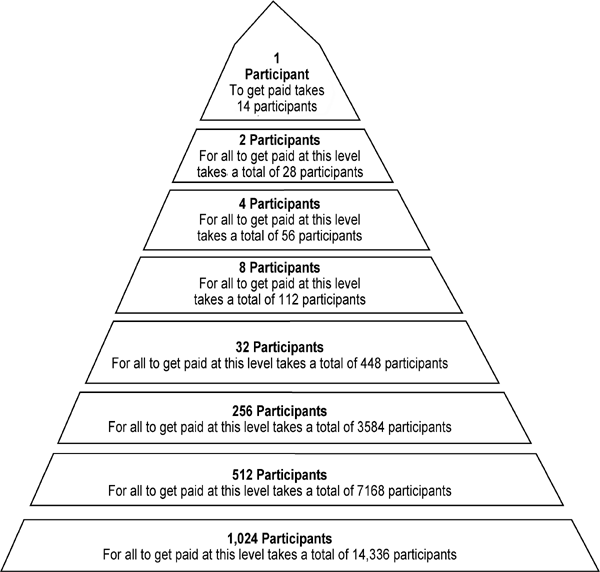Pyramid schemes, which are an old consumer fraud device, are reappearing throughout Washington state. Based on consumer complaints, pyramid scheme operators are preying on the elderly, immigrants, church members, employees of major corporations, and even police and fire department personnel.
Although they take different guises, all classic pyramid schemes work the same. In every case the vast majority of participants end up losing everything they invest. In a pyramid scheme, only a few -- usually the con artist and a small group of accomplices who start the pyramid -- make money. They do so by convincing others to give them as much as $5,000, based upon a promise they will get even more in return.
FTC ALERT:
The Gifting Club "Gotcha"
Pyramid operators benefit from the fact that on the surface, their schemes look simple. An individual is asked to contribute money, and in exchange, as new people are recruited into the scheme, money will flow back to them. But the results of pyramids are inevitable and predictable. All eventually collapse and fail.
In order for everyone to win under a pyramid scheme, the recruiting would have to go on forever. Here’s another way to think of it. If the earth’s population was 5 billion and everyone got involved in a pyramid scheme, in order for there to be 500 million winners, 4.5 billion must be losers.
Although illegal, pyramid schemes remain popular because the promise of quick, easy money lures people. Typical sales pitches try to convince people they are near the top of the pyramid. And for good reason. The following chart illustrates how difficult it is for those who are not at the top of the pyramid to expect payment.

Since many people know pyramids are illegal, they also need to be convinced that what they are involved in is not a pyramid scheme. As a result, pyramid schemes today are being described in different terms, such as clubs or gifting groups. Pyramid scheme operators attempt to convince people they are involved in a club to make an investment or to raise money by making "gifts" to help someone else -- like making it possible for a single mother to buy her first house.
Pyramid schemes recently have operated throughout Western Washington and in Ellensburg, Yakima and the Tri-Cities. A group called "Women Helping Women" uses female camaraderie and empowerment as a powerful hook. After losing their money, many of those who joined said they couldn’t afford to buy Christmas presents for their children or pay their bills. In Mill Creek, one scheme called the "Dinner Club" was failing and a fight broke out between two men who ended up in the hospital with fairly serious injuries.
The bottom line is this: if it sounds too good to be true... it is!
For more information see the Consumer Protection's Illegal Pyramid Scheme page.

 Other Languages
Other Languages